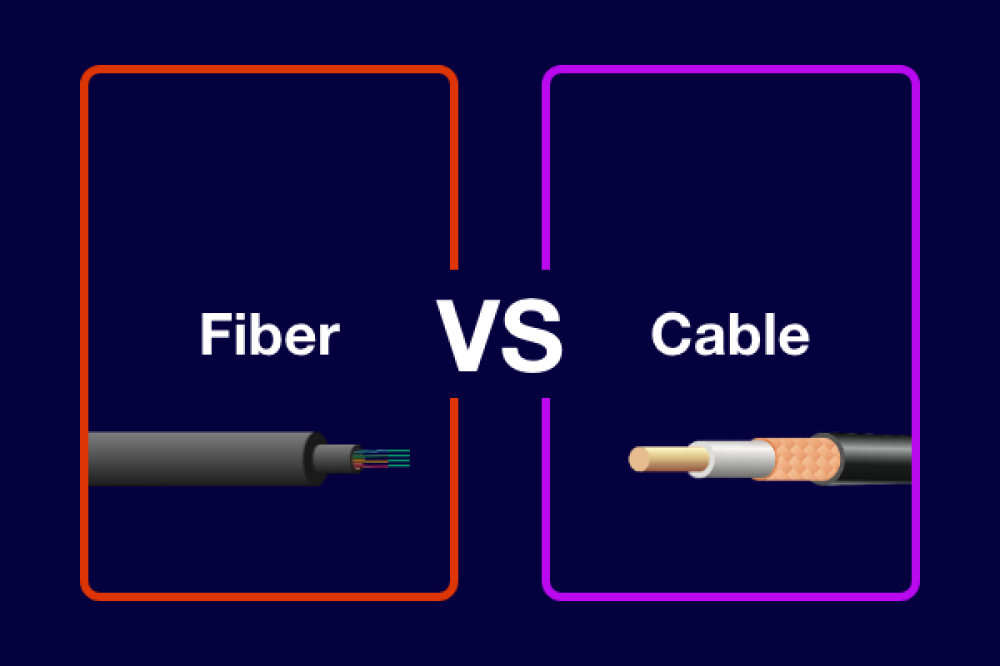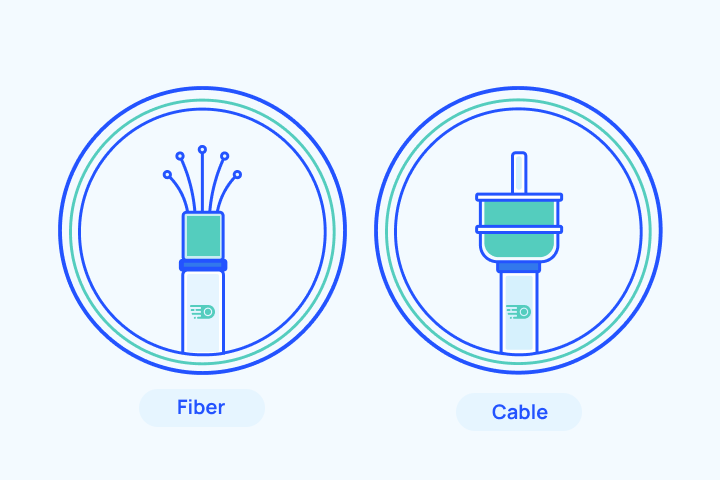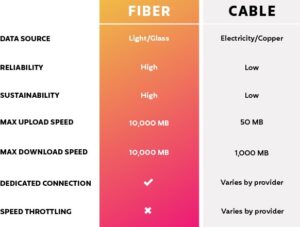“Fiber Vs Cable Internet”
Choosing the right internet connection can feel confusing. You’ve probably heard about fiber and cable internet, but which one truly fits your needs?
Whether you work from home, stream movies, or game online, your internet speed and reliability matter. This guide will help you understand the key differences between fiber and cable internet so you can make the best choice for your lifestyle. Plus, if you want a fast and dependable option, check out Astound, known for great deals on high-speed internet and more. Keep reading to find out which internet service will keep you connected without frustration.

Credit: www.inmyarea.com
Table of Contents
ToggleIntroduction To Fiber And Cable Internet
Choosing the right internet connection affects your daily online experience. Fiber and cable internet are two popular options. Both offer high-speed access, but they work differently. Understanding their basics helps you decide which suits your needs best.
Overview Of Fiber Internet Technology
Fiber internet uses thin strands of glass or plastic, called optical fibers. These fibers carry data as pulses of light. This method allows data to travel very fast and over long distances without losing quality.
Key points about fiber internet:
- Speeds can reach up to 1 Gbps or more.
- Offers very low latency and high reliability.
- Not easily affected by electrical interference.
- Supports symmetrical speeds – same upload and download rates.
Overview Of Cable Internet Technology
Cable internet sends data through coaxial cables, the same used for cable TV. It uses radio frequency signals to transmit information to and from your home.
Important facts about cable internet:
- Speeds typically range from 100 Mbps to 1 Gbps.
- Upload speeds are usually lower than download speeds.
- Performance can slow during peak hours due to shared bandwidth.
- Widely available in urban and suburban areas.
Purpose And Importance Of Comparing Fiber And Cable
Comparing fiber and cable internet helps find the best service for your needs and budget.
Reasons to compare:
- Speed: Choose based on your online activities like streaming or gaming.
- Reliability: Find a stable connection for work and entertainment.
- Cost: Understand pricing differences and value for money.
- Availability: Check which technology is accessible in your area.
Knowing these factors helps avoid issues and improves your internet experience.

Credit: www.highspeedoptions.com
Key Features Of Fiber Internet
Fiber internet offers a range of benefits that set it apart from traditional cable connections. It uses thin strands of glass or plastic to transmit data as pulses of light. This technology delivers faster speeds, stable connections, and better performance for many online activities.
Below are the key features that make fiber internet a preferred choice for users who want fast and reliable service.
Blazing Fast Speeds And Symmetrical Upload/download
Fiber internet provides extremely fast speeds that far exceed most cable connections. It supports both high download and upload speeds equally, known as symmetrical speed.
- Download speeds can reach up to 1 Gbps or higher.
- Upload speeds match download speeds, ideal for video calls, cloud backups, and large file uploads.
- Speeds remain consistent even with many devices connected.
This speed balance improves experiences in work, gaming, and streaming.
Superior Reliability And Signal Stability
Fiber internet is less prone to interference than cable. It uses light signals that do not degrade over long distances or through weather changes.
- Minimal signal loss ensures a steady connection.
- Less affected by electrical interference or physical damage.
- Network outages happen less often compared to cable.
Users enjoy a stable and consistent connection for all online tasks.
Low Latency For Gaming And Streaming
Fiber internet offers very low latency, the delay between sending and receiving data. This is crucial for activities requiring real-time responses.
- Online gaming benefits from faster reaction times.
- Video calls have smoother, clearer audio and video.
- Streaming is more reliable with less buffering.
Lower latency enhances overall internet performance.
Future-proof Infrastructure And Scalability
Fiber networks are designed to handle future internet demands. The technology can scale easily to offer faster speeds without major upgrades.
| Feature | Benefit |
|---|---|
| High Capacity | Supports growing data needs for homes and businesses |
| Easy Upgrades | Speed improvements possible with minimal hardware changes |
| Long-Term Investment | Reliable service for years without frequent replacements |
Fiber internet offers a solid foundation for future technology advances.
Key Features Of Cable Internet
Cable internet is a popular choice for many homes. It uses existing cable TV lines to deliver internet. This type of internet service offers a good balance of speed, availability, and cost. Understanding its key features helps decide if it fits your needs.
Widespread Availability And Easy Installation
Cable internet is widely available in urban and suburban areas. It uses the same coaxial cables as cable TV, which are already installed in many homes. This makes setup fast and easy.
- Most homes in cities have cable lines ready.
- Installation usually takes one visit from a technician.
- Self-installation kits are often available for quick setup.
Competitive Download Speeds For Typical Users
Cable internet offers download speeds that meet most users’ daily needs. Streaming videos, browsing websites, and online gaming run smoothly on cable connections.
| Internet Activity | Recommended Speed (Mbps) | Cable Internet Capability |
|---|---|---|
| Web Browsing & Email | 1-5 | Up to 500 Mbps |
| HD Streaming | 5-10 | Up to 500 Mbps |
| Online Gaming | 10-25 | Up to 500 Mbps |
Shared Bandwidth And Its Impact On Performance
Cable internet users in the same neighborhood share bandwidth. This can affect speed during busy hours.
- Speeds may slow down in the evening or weekends.
- Performance depends on how many users are online at once.
- Good for most activities but heavy users may notice slowdowns.
Cost-effective Infrastructure For Urban Areas
Cable internet uses existing infrastructure, which reduces costs. This makes it affordable and efficient in cities.
- No need for new cables or digging for installation.
- Providers like Astound offer competitive pricing.
- Good option for households wanting reliable internet without high cost.
Pricing And Affordability Comparison
Understanding the cost differences between fiber and cable internet helps choose the best fit. Pricing affects monthly budgets and overall satisfaction. This section breaks down each option’s pricing, value, and extra costs.
Cost Breakdown Of Fiber Internet Plans
Fiber internet plans typically offer higher speeds at a slightly higher price. Astound’s fiber packages start around $50 to $80 per month, depending on speed and features.
| Plan | Speed | Monthly Price |
|---|---|---|
| Basic Fiber | 300 Mbps | $50 |
| Standard Fiber | 500 Mbps | $65 |
| Premium Fiber | 1 Gbps | $80 |
These prices include high speed, reliable connections suited for multiple devices.
Cost Breakdown Of Cable Internet Plans
Cable internet plans often start cheaper but may offer lower speeds than fiber. Astound’s cable plans begin near $40 to $70 monthly with varied speed tiers.
| Plan | Speed | Monthly Price |
|---|---|---|
| Basic Cable | 100 Mbps | $40 |
| Standard Cable | 200 Mbps | $55 |
| Premium Cable | 300 Mbps | $70 |
Cable offers affordable entry-level plans but may slow down with heavy use.
Value For Money: Speed Versus Price Analysis
Fiber provides more speed per dollar at higher tiers.
- Fiber: Best for fast downloads, gaming, and streaming.
- Cable: Good for everyday browsing and moderate use.
Fiber’s higher price fits users needing strong, consistent speeds.
Cable suits those with basic internet needs and tighter budgets.
Hidden Costs And Contractual Considerations
Both services may charge installation fees around $50 to $100.
Modem or router rental fees often add $10 to $15 monthly.
Contracts may require 12 to 24 months commitment with early termination fees.
- Watch for price increases after promotional periods.
- Some plans include data caps; exceeding them can cost extra.
- Ask about service fees and taxes not included in listed prices.
Reading terms carefully avoids unexpected charges.
Pros And Cons Based On Real-world Usage
Choosing between fiber and cable internet depends on daily needs and real-world experience. Both types offer strong internet, but their benefits and challenges vary. Understanding these differences helps users pick the best option for home or work.
Advantages Of Fiber Internet In Daily Use
- Faster Speeds: Fiber delivers consistently high download and upload speeds.
- Low Latency: Perfect for gaming, video calls, and streaming without lag.
- Stable Connection: Fiber is less affected by weather or electrical interference.
- Future-Proof: Fiber networks support growing internet demands with minimal upgrades.
- Symmetrical Speeds: Upload and download speeds are usually equal, ideal for content creators.
Many users notice smoother streaming and quicker downloads with fiber. It handles multiple devices with ease, making it great for busy households.
Limitations And Challenges Of Fiber Deployment
- Limited Availability: Fiber is not yet in all neighborhoods, mainly urban areas.
- Installation Costs: Laying fiber cables requires digging and new infrastructure.
- Longer Setup Time: Fiber installations can take weeks or months in some locations.
- Higher Initial Price: Some fiber plans may cost more than cable options.
These factors slow down fiber’s reach, especially in rural or less populated areas.
Advantages Of Cable Internet For Consumers
- Wide Availability: Cable internet serves many urban and suburban areas.
- Affordable Plans: Cable providers often offer competitive pricing.
- Easy Installation: Uses existing coaxial cables, reducing setup time.
- Good Speeds: Cable delivers fast internet for most daily tasks.
- Bundled Services: Cable companies often bundle internet with TV and phone.
Cable suits users who need reliable internet without fiber’s higher cost or wait times.
Drawbacks And Performance Issues With Cable
- Shared Bandwidth: Speeds can slow during peak hours as neighbors share connections.
- Asymmetrical Speeds: Upload speeds are often much slower than downloads.
- Signal Interference: Electrical noise can affect connection quality.
- Less Future-Proof: Cable infrastructure may struggle with very high speed needs.
Users may experience slower upload speeds and occasional buffering during heavy internet use times.
Ideal Users And Usage Scenarios For Fiber And Cable
Choosing between fiber and cable internet depends on user needs and usage habits. Both offer fast connections, but each suits different lifestyles and demands. Understanding who benefits most from each helps pick the best service.
Who Should Choose Fiber Internet And Why
Fiber internet fits users needing ultra-fast, stable connections. It suits:
- Large families with many devices
- Remote workers handling video calls and large files
- People streaming high-definition or 4K videos
- Users wanting future-proof internet speed
Fiber delivers symmetrical upload and download speeds. It reduces lag and buffering. The connection is less affected by weather or distance.
Best Situations For Opting Cable Internet
Cable internet works well for moderate to heavy users on a budget. Ideal for:
- Homes with several users but lighter upload needs
- Streaming HD content and casual gaming
- Areas where fiber is unavailable
- Users who want fast downloads without paying premium prices
Cable provides solid speed but usually with slower uploads. It uses existing TV cable lines, making it widely accessible.
Comparing Fiber And Cable For Remote Work And Streaming
| Feature | Fiber Internet | Cable Internet |
|---|---|---|
| Download Speed | Very high, up to 1 Gbps or more | High, up to 500 Mbps or more |
| Upload Speed | Symmetrical and fast | Slower than download speed |
| Connection Stability | Highly stable, low interference | Stable but can slow with heavy neighborhood use |
| Streaming Quality | Excellent for 4K and live streaming | Good for HD streaming |
Remote work benefits from fiber’s fast uploads for video calls. Streaming 4K movies runs smoother on fiber. Cable suits general streaming and remote tasks.
Suitability For Gaming, Smart Homes, And Heavy Data Usage
Gaming demands low latency and fast, steady speeds. Fiber excels here with low ping and quick response times. Cable works but may lag during peak hours.
Smart homes with many connected devices need reliable bandwidth. Fiber supports many gadgets simultaneously without slowdown.
Heavy data users benefit most from fiber’s high capacity. Large downloads, backups, and cloud use go faster.
| Usage Type | Fiber Internet | Cable Internet |
|---|---|---|
| Online Gaming | Best for low latency and fast speeds | Good but may vary by time of day |
| Smart Home Devices | Handles many devices smoothly | Works but can slow with many devices |
| Heavy Data Use | Ideal for large uploads/downloads | Decent for downloads, slower uploads |
Conclusion: Making The Right Choice Between Fiber And Cable
Choosing between fiber and cable internet depends on your priorities. Both offer fast connections, but their strengths vary. This section clarifies key points and helps you decide which suits your needs best.
Summary Of Speed And Reliability Differences
Fiber internet uses light signals through glass fibers. It delivers symmetrical speeds, meaning upload and download speeds are equally fast. Fiber offers speeds up to 1 Gbps or more, with very low latency and minimal interference.
Cable internet uses coaxial cables. It often provides high download speeds but slower uploads. Speeds can reach up to 500 Mbps or more, but performance may drop during peak hours due to shared bandwidth.
| Feature | Fiber Internet | Cable Internet |
|---|---|---|
| Maximum Speed | Up to 1 Gbps+ | Up to 500 Mbps+ |
| Upload Speed | Equal to Download Speed | Lower than Download Speed |
| Reliability | Very High, Less Interference | Good, Can Slow in Peak Times |
| Latency | Low | Moderate |
Factors To Consider Before Choosing Your Internet Type
- Availability: Fiber may not be in all areas, cable has wider coverage.
- Usage Needs: Heavy upload users benefit from fiber’s symmetrical speeds.
- Budget: Cable plans often cost less than fiber initially.
- Internet Activities: Streaming, gaming, and remote work thrive on fiber.
- Future Proofing: Fiber technology supports faster upgrades over time.
Final Recommendations Based On User Needs And Location
Choose fiber internet if:
- You want the fastest and most reliable connection.
- You upload large files or video chat often.
- Your area supports fiber services like Astound Fiber.
Choose cable internet if:
- Your location lacks fiber access.
- You have moderate internet needs like browsing and streaming.
- You want a budget-friendly option with decent speeds.
Astound offers both fiber and cable plans with competitive prices. Check availability at Astound to find the best internet type for your home or business.

Credit: www.iqfiber.com
Frequently Asked Questions
What Is The Main Difference Between Fiber And Cable Internet?
Fiber internet uses light signals through glass fibers, offering faster and more reliable speeds. Cable internet uses electrical signals over coaxial cables, which can be slower and prone to interference.
Which Internet Is Faster: Fiber Or Cable?
Fiber internet is significantly faster than cable internet. It provides symmetrical upload and download speeds up to 1 Gbps or more, while cable speeds are often slower and less consistent.
Is Fiber Internet More Reliable Than Cable?
Yes, fiber internet is more reliable. It is less affected by weather or distance, ensuring consistent speed and low latency compared to cable connections.
Does Fiber Internet Cost More Than Cable?
Fiber internet can be slightly more expensive due to advanced technology. However, the speed and reliability benefits often justify the higher price for many users.
Conclusion
Choosing between fiber and cable internet depends on your needs and budget. Fiber offers faster speeds and better reliability. Cable internet is often more available and can be less expensive. Both options can support streaming, gaming, and browsing well. For a dependable service with great prices, consider Astound. They provide high-speed internet, mobile, and TV packages that fit many households. Weigh your priorities, then pick the best fit for your home. Good internet makes all online activities smoother and more enjoyable.

